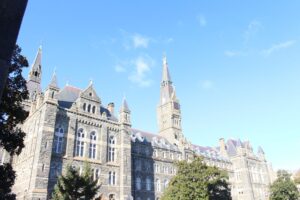Every August, the Voice’s editorial board offers advice to incoming students on how to adjust to life at Georgetown. Enrolling as a new student means not only finding a home on the Hilltop but learning to navigate living in Washington, D.C.
This is a big transition and there is a lot to take in these first few weeks, and it’s okay to be overwhelamed. Take this fall semester one step at a time. We are students, first and foremost, and it’s alright to just focus on that. There are abundant obligations and new experiences on campus that can make Georgetown feel far larger than it really is—from living independently for the first time to making all new friends, let alone managing classes, jobs, clubs, and other commitments.
So, in this letter, we’d like to introduce you to your new home, and city, and share advice on how to be an informed resident of the District. There’s so much value that we hope you find here at Georgetown, but there’s also so much experience beyond its gates.
Let’s start with campus. It’s easy for students to feel disconnected from the city while living inside “the Georgetown bubble.” Tucked away in northwest D.C., Georgetown has no Metro stop, making it difficult to come and go from the neighborhood. How you venture out into the city is tied to financial access: 60% of Georgetown students come from the top 10% of wealthy families in the U.S., while only 15% come from the bottom 60%. This disparity mediates how students experience this city and their education—and it can be alienating, at times. On top of the student body’s wealth disparities, the university was founded as a white-only institution and remains predominantly white today. Our university’s existence would not be possible without its involuntary founders—Black Americans enslaved by the Jesuits. Not only did enslaved people labor on campus, but the 1838 sale of over 314 enslaved men, women, and children—the GU272+—saved the university from bankruptcy.
Zooming out from campus, the surrounding Georgetown neighborhood was once historically Black, though today, its residents are predominantly white. This shift reflects a larger trend in D.C.’s demographic makeup. Students should learn the history of the “Chocolate City” and how a litany of racist policies have displaced and disenfranchised Black residents. D.C. had the highest percentage of gentrifying neighborhoods in the country between 2000 and 2013, according to one 2019 study. We encourage students to follow current fights for housing justice, including those in migrant centers, historic cultural enclaves, and homeless encampments, and to hold their elected officials accountable on these issues.
Looking towards Capitol Hill, we’d also like to welcome you to the epicenter of national politics. While media attention has focused on the presidential race, there is probably an important down-ballot race in your hometown you should watch.
Next to the Capitol is the Supreme Court, whose ultra-conservative agenda has systematically eroded personal freedoms, criminalized our country’s vulnerable populations, granted presidents broad immunity from criminal liability, and weakened federal agencies. Our close proximity affords us the ability to protest these actions at our government’s front door. But in this political climate, all action carries risk. If you choose to participate in a protest, know your rights, be aware of potential risks, and prepare accordingly. If direct action is not for you, know that there are other ways to advocate for causes you care about. The stakes of our participation in the political process are incredibly high. This fall could be your first-time voting—make a plan for it, now. Mail-in and absentee voting takes time, especially with Georgetown’s mail system.
Students have also become increasingly vocal about how international events show up in their lives. This past spring, college students across the country faced suspension, arrest, violent counterprotesters, and police brutality for peacefully protesting Israel’s ongoing genocide in Gaza. At Georgetown, numerous vigils, walkouts, and protests culminated in a two-week-long encampment at George Washington University. Students from a number of nearby schools demanded their universities divest from corporations with ties to the Israeli military.
On the 15th night of the encampment, nearly 150 MPD officers cleared it by force, pepper spraying protesters and arresting 33 people, including seven Georgetown students. While there are many misleading narratives perpetuated by the media about pro-Palestine activism, we must not lose sight of what’s important: an end to Israel’s genocide in Gaza. We should condemn fringe examples of antisemitism at pro-Palestine protests, some of which are perpetuated by white supremacist infiltrators. We must also condemn police brutality and harassment of protesters and organizers, and most importantly, continued U.S. support for Israel’s slaughter of Palestinians. Pro-Palestine activism should not be equated with antisemitism; students have a responsibility to fact-check and elevate the systemically marginalized perspectives of Palestinians.
As young people, we have a responsibility to make a difference in our community. Your time here is limited, and you will have to make trade-offs. You might not have the bandwidth to engage with the small snapshot of issues we’ve named. However, we hope you start your college experience with a mindset of community care. Explore the city, connect with its history, participate in local politics, exercise your right to vote, and advocate for what you believe in.
We’ve said in our previous letters that there isn’t a criterion you have to meet to qualify for having the “college experience,” because you define your own experience. We just ask that you start that journey with grace for yourself and for one another. There is a lot to change about Georgetown, D.C., and our country, but maybe a stronger ethics of care is where to start. Wherever this year brings us, we hope that you can use this time to make our community better.
With hope,
The Voice editorial board
…
The editorial board is the official opinion of The Georgetown Voice. The board’s editorials reflect the majority opinion of the board’s members, who are listed on the masthead. The editorial board strives to provide an independent view on issues pertinent to Georgetown University and the broader D.C. community, based on a set of progressive institutional values including anti-racism, trauma-informed reporting, and empathetic and considerate journalism. The editorial board operates independently of the Voice’s newsroom and the General Board.






